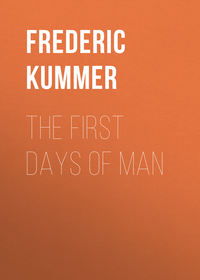 полная версия
полная версияThe Film of Fear
He went down to the theater very early, after a hasty dinner, and found Mr. Baker in the box office. The moving picture man did not recognize him, of course, and Duvall, after drawing him aside, had some little difficulty in convincing him of his identity. Once it had been established, however, Mr. Baker conducted him to a dressing room behind the scenes, and motioned him to a chair.
"We can talk here without being seen or heard," he said. "Is there anything new?"
"Nothing. I have taken Mrs. Morton and her daughter to a hotel, where I feel sure they will be quite safe from further annoyance. Ruth will not come to the studio for a few days, until we have gotten to the bottom of this affair. I am staying in an adjoining room, so as to be on hand at once in case of any trouble. I suppose you have everything fixed for to-night?"
"Yes." Mr. Baker's tone was dubious. "I have inserted in the film the material you gave me. It will appear just at the end of Part I. I hope it will not spoil our picture."
"I think not. As a matter of fact, when the reasons for its introduction become known, I imagine it will give you a lot of very valuable advertising."
"Possibly so," Mr. Baker granted. "But after all, I begin to feel very doubtful as to the results. This woman, whoever she is, that is persecuting Miss Morton seems to be mighty clever. She may not be affected in the way you think, by what she sees on the screen."
"I realize that. It is only a chance. But don't you think that, under the circumstances, it is a chance worth taking?"
"Most certainly; otherwise I should not have consented to it. But, as I say, I doubt very much its success."
"Well – we can only try. You will remember what I said about the lights, and the call for a doctor, if one appears to be needed."
"Yes. I have all that in mind. Miss Morton is not coming to-night, I presume."
"No. I advised against it."
"I'm glad of that."
Duvall sat in silence for a moment.
"By the way," he said presently. "There is one important matter that I have overlooked. Do you give your employees passes for these opening performances?"
"No – not regularly, that is. But any member of our organization who wishes to see the performance would of course be admitted. We reserve a section of the house for that purpose. A number of our people usually come over."
"Good! That's just what I had hoped for. Where is this section?"
"The last five rows on the left-hand side of the house. But why?"
"Don't you see? All the evidence points to the fact that the person who is responsible for these threats either works in your studio, or is in some way able to gain access to it at any time. Witness the stolen photograph – the substituted telegram of this morning. In the latter it was definitely stated that the woman in the case would be in the audience to-night. I am hoping sincerely that she will not have the cleverness to enter as one of the public, but will come in as one of your people, and sit in the section of the house reserved exclusively for your employees. In that event, I think we shall discover who she is beyond a doubt."
"I certainly hope so," sighed Mr. Baker. "This thing has got us all up in the air. Our President had a long conference with me this afternoon about Miss Morton. He seems to think she is going to pieces, and recommended trying to get Joan Clayton away from the Multigraph people to take her place. He says that she is losing her good looks. I told him nothing, of course, but it worried me a lot. I am very fond of Ruth Morton, and I don't want to see her lose her place."
"She won't lose it," asserted Duvall. "When we get through, her position with your company will be stronger than it has ever been before. Shall we go out in the lobby and take a look at the crowd as it comes in?"
Mr. Baker assented, and the two men stationed themselves near the box office.
Without appearing to do so, Duvall inspected the various members of the incoming crowd. His scrutiny was careful, comprehensive, but the only person he recognized was Grace.
That she also recognized him he knew. She had seen the disguise he wore, many times, and was familiar with it. She did not betray herself, however, by so much as a glance, but proceeded at once to her seat.
When the moment arrived for the beginning of the performance, the house was filled. Duvall, with Baker at his side, stationed himself back of the left-hand section of seats, so that the rows reserved for the employees of the company were directly in front of him. He occupied himself, during the interval before the lights were switched off, by noting carefully all the women in the last five rows, but none of them attracted his attention particularly.
Soon the performance began. Ruth Morton, the American Beauty, stepped upon the screen, a compelling vision of loveliness. The audience followed eagerly her exciting adventures. Duvall himself, in spite of his preoccupation, found himself absorbed by the charm and action of the picture. In the opening scenes, Ruth appeared as a poor girl, trying to make her way in the great world of the theater. Her struggles, her sacrifices, her failures, were almost vividly portrayed. When at last, through her marvelous beauty, she succeeded in gaining recognition from the critics, he applauded with those about him, completely under the spell of her charm.
The final scene of the first part was a view of Ruth, as Catherine Grey, the American Beauty, refusing the dubious offers made her by a rich New Yorker. With a faith in herself by no means assumed, Catherine turned from his picture of luxury, of steam yachts, of country estates, of unlimited bank accounts, with a smile which showed her confidence in her beauty, her talents. The audience watched her, spellbound, as she stood on the sidewalk before the theater, looking with grave inscrutable eyes after the costly limousine that had just driven away without her. In no picture heretofore taken of the girl had she appeared to better advantage. Every line of her lovely face seemed responsive to the effect of the lighting, the situation, the motives which inspired her. The audience drew itself back, ready to register its approval of the first part of the film with hearty applause.
And then, something happened. The lovely, smiling face of Ruth Morton faded from view, and in its place came with brutal suddenness the picture of a huge grinning death's head, amazing in its suggestion of horror. The audience sat in utter silence, wondering what could be the reason for this sudden apparition. Beneath the death's head appeared in huge letters the words:
"We know the woman."The thing had come as a complete surprise. The tension throughout the house was electric. Duvall saw his wife rise from her seat on the aisle, a few rows away, and come quickly to the rear of the house. She, at least, realized that a moment of importance had arrived.
And then, without warning, the stillness of the theater was broken by a sudden cry, and a woman, sitting some three rows from where Duvall stood, but on the opposite side of the aisle from the seats indicated by Mr. Baker, rose to her feet, turned, and fell heavily against the back of the seat ahead of her. At almost the same moment the lights were switched on, and a voice was heard calling. "Is there a doctor in the house?"
It was Mr. Baker, and Duvall, who stood beside him, sprang forward at once.
"I am a doctor," he cried, and approached the place where the woman sat.
"Can I be of any assistance?" Grace asked. "I am a trained nurse."
"Yes," replied Duvall, quickly. "Get this woman to the ladies' dressing room at once."
Grace sprang forward. There was a bustle among the audience, a sudden rising, a craning of necks. Everyone seemed to be looking for the person who had uttered the sudden cry. Before anyone fully realized what had happened, Grace had reached the fainting woman's side, and supporting her with an arm about her waist, was leading her toward the rear of the house.
Almost at once the theater became dark, and the second part of the picture was flashed upon the screen. The lovely face of Ruth Morton once more greeted the eyes of the audience. The interruption had occupied less than a minute.
Duvall, standing at the entrance to the aisle, watched Grace come quickly toward him, supporting the fainting woman. The latter seemed completely overcome, and Grace was obliged almost to carry her.
"Keep her there, in the dressing room, until I return," he said in a quick whisper. Then with a nod to Mr. Baker, who stood close by, he went toward the street. A taxicab drew up, awaiting a fare. Duvall signaled to it.
"Wait for me here," he said to the driver. "I will be back in a moment." Then he re-entered the theater.
Grace meanwhile had conducted the woman to the ladies' dressing room, and placed her upon a couch.
She was a frail, insignificant looking creature, not at all the sort of person one would associate with threats of the kind that Ruth Morton had been receiving. She appeared to be greatly ashamed of her sudden collapse, and kept insisting, in spite of her evident weakness, that she was quite all right again, and wanted to go.
Grace, however, paid no attention to her protestations, but insisted that she remain quiet.
"The doctor will be here in a moment," she said. "You must wait quietly until he comes."
The woman, however, seemed determined to leave, and it was with a sigh of relief that Grace welcomed her husband's return.
Duvall came in hurriedly, as he did so taking a small brown bottle from his waistcoat pocket.
"Get me a glass of water," he said to the negro maid. The woman brought one at once.
Duvall took a tablet from the bottle and placed it in the glass, stirring the water about with the end of a lead pencil until the tablet was dissolved. Then he went up to the woman on the couch.
"Here – drink this," he commanded. "It will quiet your nerves."
The woman took the glass, her eyes regarding him with suspicion. Duvall, in his character of a physician, turned aside, and addressed a few words to Grace, fearing that in some way the woman might succeed in recognizing him. As a result both failed to see that instead of drinking the medicine he had given to her, the girl swiftly poured it upon the floor. When he again turned to her, she held the empty glass in her hand.
Duvall took it from her, and handed it to Grace.
"Come with me, Miss," he said. "I will see you home."
"It isn't necessary," the woman gasped. "I – I'm all right now."
"You have had a severe shock, Miss. As a physician, it is my duty to see that you arrive home safely. I have already engaged a cab. Come." He took the woman by the arm and in spite of her objections, raised her from the couch.
Suddenly her opposition vanished. She seemed glad of his assistance, and, leaning on his arm, made her way from the theater. Duvall was in high spirits. He fully believed that his plan had succeeded, that the woman at his side was the one who was responsible for the threats which had made Ruth Morton so wretched for the past few days.
The cab that he had engaged stood waiting at the door. He put the woman inside. She seemed very weak and helpless. "Drive to the – Hotel," Duvall called to the chauffeur, then entered the cab and seated himself at the woman's side. He saw Mr. Baker standing upon the sidewalk, and nodded. Then they drove off.
The woman lay, in a state of apparent collapse, in one corner of the cab, her face pale, her eyes closed. Duvall, inspecting her as well as he could in the faint light, began to feel grave doubts as to whether after all he had been successful in his ruse. She seemed so little the type of woman he would have associated with the brutal campaign of terror that had been directed against Miss Morton.
She clutched a black leather satchel tightly in one hand. Duvall regarded it with interest. If he was right in his assumption that this was the woman he sought, it seemed highly probable that within that satchel lay evidence that might convict her. At least there would be some clue as to who she was, and that in itself would be valuable.
The woman seemed to grow weaker and weaker. Her closed eyes, her slow but regular breathing, indicated that the drug he had given her had begun to take effect. Stealthily Duvall's hand reached toward the small black satchel. With eager fingers he pressed the catch, and as the bag opened, began to draw out its contents.
The woman, however, seemed far less helpless than he had supposed. She pulled the satchel toward her, her fingers seeking to close it. Duvall discontinued his efforts at once. It would be time enough, he felt, when they had reached the hotel, and the woman had been safely conducted to a room there. He had made his plans carefully in advance, and arranged matters with the hotel manager. There was nothing to do, now, but wait.
Presently the woman, who had been regarding him, unnoticed, from beneath lowered lids, uttered a groan, as though in great pain, and clutched her breast. Duvall turned to her at once, speaking in a soothing voice, and assuming a professional manner.
"Is anything wrong, Miss? I had hoped you were feeling better."
"No, doctor. I'm not. I feel terrible – terrible."
"In what way?"
"My – my heart. It is in awful shape. I need some stimulant. The – the medicine you gave me made me feel very ill."
Her words surprised Duvall. He had given her a simple drug, the effect of which should have been to make her drowsy, to quiet her nerves. That she had not taken it, he of course did not know. His greatest fear had been that she would refuse to enter the cab with him. Now that she had done so, he was prepared to use even force, if necessary, to retain her in his custody until he had either obtained the evidence he desired, or forced from her a confession. What he particularly hoped to find was the seal with which the death's head impression had been made. He felt certain that, if this was the woman he sought, she would have this seal somewhere about her person. It was far too significant a bit of evidence to be left lying about at home.
But there was always the chance that this woman, who had been so instantly affected by the ghastly apparition on the screen, the significant words beneath it, might not, after all, be the right one, the one he sought. There was always the possibility that the real criminal, although present in the audience, had made no sign, and that his companion in the cab might be entirely innocent. As he had told Baker, it was a chance – a long chance, yet something seemed to say to him that he had made no mistake in taking it. Now, however, a new situation had arisen to upset his plans. His prisoner, instead of having been quieted by the drug he had administered, was apparently becoming more and more agitated and nervous every minute. Her groans, as she lay huddled up in the corner of the cab, puzzled him, filled him with vague alarm. Was it possible that she had a weak heart? Had the sedative he had given her, harmless as he knew the dose would be to a normal person, affected her in so unfavorable a way? He took her wrist in his hand, and felt her pulse. It was quick, indicative of nervous excitement, but certainly not weak.
"Oh – doctor, doctor, won't you please give me something to make me feel a little better?" the woman gasped. "It's my heart, I tell you. I – I can't breathe. I'm suffocating. I must have something at once – some aromatic spirits of ammonia – some brandy – anything, to make me feel a little better."
Her earnestness, her trembling voice, her excited manner, all served to convince Duvall that his companion was really in need of a stimulant of some sort. He decided to humor her. A dose of aromatic spirits, he reflected, could do no harm, and would doubtless serve to lessen her excitement. He leaned out, and directed the driver of the cab to stop at the nearest drug store.
"Oh – thank you – thank you," the woman gasped. "Tell him to hurry, please." Then collapsing in the corner of the seat, she closed her eyes and sat so silent that Duvall began to wonder whether she had lost consciousness.
The taxicab, meanwhile, had drawn up in front of a drug store on Sixth Avenue. Duvall took a look at the apparently unconscious woman, then spoke quickly to the chauffeur.
"Stay here until I return," he said. "Don't go away under any circumstances. I shall be gone but a moment."
The man nodded.
"I'll stay, sir," he said. "Don't worry."
Duvall went quickly into the store. Going up to the soda counter, he instructed the clerk to prepare him a dose of aromatic spirits of ammonia as quickly as possible. While waiting for it, he watched the cab through the store window.
The preparation of the dose required but a few moments. Then, explaining matters to the clerk, Duvall took the glass in his hand and went back to the cab. He smiled to himself at his anxiety, as he passed through the door. The woman was far too ill, he reflected, to entertain any thoughts of escape.
"Here," the detective said, opening the door of the cab. "Drink this."
There was no response. Duvall stuck his head into the vehicle with some misgivings. Then he experienced a sudden and most mortifying shock. There was no fainting woman huddled against the cushions in the far corner. There was no woman at all. The cab was empty!
CHAPTER XI
Richard Duvall had had charge of many unusual and intricate cases, in the past, and he prided himself upon the fact that he had handled them with skill and discretion, and that the results which had followed had been both quick and decisive. But in all his career he had not, so far as he could remember, ever felt quite so chagrined, as he did when he threw open the door of the cab and found that the woman he had left there had disappeared.
The fault was his, he knew that well – entirely and unmistakably his. This woman was evidently far more clever, more subtle than he had imagined. He realized now that she had in all probability not taken the drug he had given her in the dressing room of the theater, that she had seen his effort to examine the contents of her handbag, that her weakness, her call for a stimulant of some sort had been but clever acting, and that she had purposely sent him into the drug store in order that she might escape. He blamed himself, utterly and completely, for his amazing stupidity in not realizing that the woman, instead of ordering the cabman to drive away, had only to slip out through the door on the opposite side of the vehicle, and vanish in the darkness.
And this she had quite evidently done. The door of the cab opposite him stood open. No doubt she had purposely refrained from closing it, fearing that the click of the lock might attract the driver's attention. The latter with his eyes following Duvall, as the detective entered the store, had remained serenely unconscious of his passenger's movements, her clever escape.
At least three or four minutes had elapsed. Duvall glanced up and down the street, but no sight of the vanished woman greeted his anxious gaze. She had had ample time to reach the next corner, and disappear in the darkness. Thoughts of pursuit entered his mind, but he realized at once the fruitlessness of such an attempt. His captive might have fled east or west, at either of the streets north or south of where he stood. Or she might have entered some restaurant, some motion picture house, or other convenient doorway along the Avenue. She might even have boarded a Sixth Avenue car, or hailed a passing cab. He looked up at the chauffeur, who still sat at his steering wheel, totally unaware of the flight of one of his passengers.
"The woman has gone," Duvall exclaimed, nodding toward the vacant cab.
The man turned in complete surprise. He seemed scarcely able to credit the evidence of his senses.
"I – why sir – she was here just a moment ago, sir," he gasped, gazing into the interior of the cab as though he expected its recent occupant to suddenly materialize in the flesh.
"She got out on the other side, while I was in the store," Duvall remarked, shortly, then taking an electric searchlight from his pocket, made a thorough examination of the interior of the cab. He scarcely expected to find anything, although it flashed through his mind that the woman, in her hurry to escape, might have left her bag, her gloves, or something that might afford him a clue to her identity.
At first he saw nothing. Then, as his eyes became more accustomed to the brilliant glare of the electric torch, he observed a bit of white cardboard lying on the floor. It looked like a visiting card, and he snatched it up, devoutly hoping that it had fallen from the woman's bag during the attempt he had made to rifle it.
Under the light of his pocket lamp he made a quick examination of his find. It proved a lamentable disappointment. It was in fact a visiting card, or to be more correct, the torn half of one, but what was engraved upon it afforded him not the least clue to either the identity or the address of the woman he sought. On the first line were the words, "Miss Mar" – then came the torn edge of the card. On the second line there was but the figure 1, and then the break.
Was the name so tantalizingly suggested by the letters before him "Miss Mary" something or other? Or "Miss Margaret?" Or was it "Miss Martin," or "Miss Marvin," or "Miss Marbury," or any one of a score of other names beginning with the letters "Mar?" And what was the missing address? What numbers followed the figure 1, on that part of the card that had been torn off? And what was the name of the street? He realized at once that while what he had found might, under certain circumstances, act as a suggestion, it would not serve to get him very far, unless reinforced by other and more definite evidence. He thought for a moment of securing from Mr. Baker a list of the women employees of the studio. It was true, he remembered, that his prisoner had not been seated in that particular section of the house reserved for the company's employees, but that might have readily come from the fact that the section was fully occupied when she arrived. Then, as more names beginning with "Mar" occurred to him, the futility of the idea became apparent. Apart from any possible number of Marys, and Margarets there were Martha, Maria, Marcia, Marian, Marcella – others perhaps. Of course he would be able to recognize the woman, if he saw her, but she would be too clever to return to her place in the studio the following day, if by any chance she worked there, knowing, as she must inevitably know, that she would be identified at once.
Still, there was of course the chance that Mr. Baker might have recognized her. He presumably knew all the employees of his company by sight. Duvall got into the cab with a mortifying sense of having made a very foolish blunder, and directed the cabman to drive him back to the Grand Theater.
Mr. Baker was waiting in the lobby when the detective arrived, and at a nod from the latter the two men retired to the dressing room in which they had had their previous consultation. The moving picture man's face was eager, expectant, as he waited for Duvall to speak, and the latter felt his chagrin increase by the moment.
When he had at last finished his account of the affair, Mr. Baker looked exceedingly grave.
"Too bad – too bad," he muttered, "to have had her in our hands like that, and then, to lose her."
"Did you ever see the woman before?" Duvall questioned.
"No. Of course she might be in our employ, but I doubt it, although I could not be expected to know by sight every girl who works in the plant. There are stenographers, film cutters and pasters, dozens of others, that I do not engage directly, and never see. Let me look at the card."
Duvall handed the torn bit of pasteboard to him.
"Not much to go on," he said, quietly.
"No. Not much."
"Of course," the detective went on, "the evening has not been entirely wasted. We know the woman by sight, and that is a great deal. As for her name, I have made a careful study of this card, and assuming it to have been of the usual length in comparison to its width, the name following the 'Miss,' if it was a first name, points to a very short one, such as Mary, and not a long one, such as Margaret."
"How do you make that out?"
"Simply enough. The entire name would of course have been placed in the center of the card, which was, it appears, torn almost exactly in half. On the left-hand side, which we have in our possession, there are, in the word 'Miss,' four letters, and in 'Mar' three, or seven in all. We should correspondingly expect to find seven letters on the right or missing half of the card. But were the first name Margaret, or Marcella, which each contain eight letters, or five to be added to the 'Mar' we already have, it would leave but two letters for the woman's last name, and names of that length, or rather shortness, are so rare as to be negligible. It is far more probable that we have but to add a 'y' to the 'Mar,' or one letter, leaving six for the last name. This would give us 'Miss Mar-y Gordon,' with the name evenly divided by the tear. Or, if by chance, the first name is such a one as Marian, containing six letters, we need add but the 'ian,' or three letters, to the left-hand side of our card, leaving us four letters for the last name. Thus, Miss Marian Kent. The full name on the card should have just fourteen letters, provided the card is, as I conclude, torn exactly in half."






